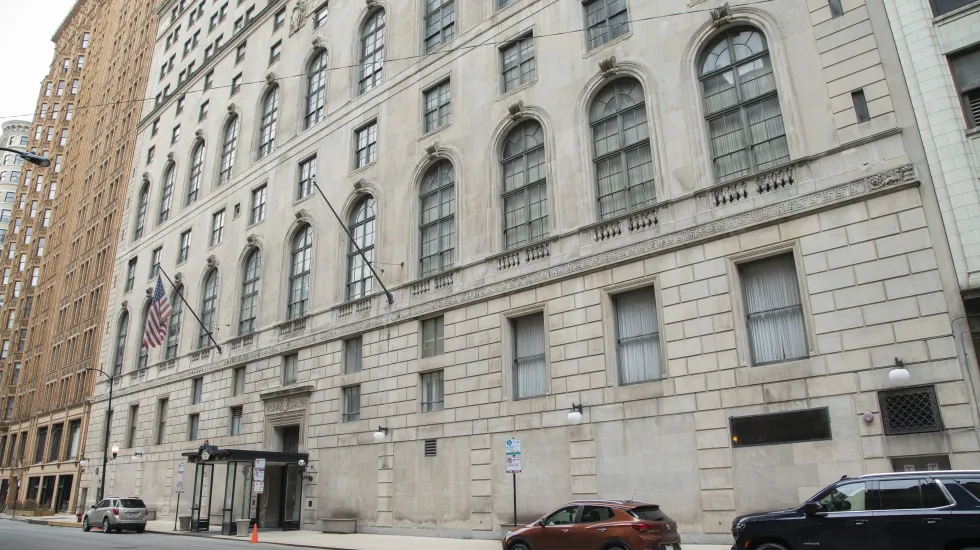
Depending on your age, you can stroll through downtown Chicago and see a lot of things that aren’t there anymore.
The mind’s eye might conjure Carson’s, Trader Vic’s, Mayor’s Row, Stop & Shop, Kroch’s. Rose Records or maybe whole buildings like the pocket-sized Showmen’s League of America on Randolph Street whose façade had images of circus elephants. At least Marshall Field’s survives as Macy’s, and the retailer is trying a new tack with discounted merchandise that calls to mind the old bargain basement days. Maybe nostalgia dressed for a new age will sell.
For high society, there’s been a culling of places where the well-off and well-connected congregate in good taste. Gone are membership venues such as the Chicago Athletic Association, refashioned as a hotel, and the Tavern Club, now an event space. The University Club of Chicago and the Union League Club of Chicago soldier on.
The Standard Club, long a center of Jewish life, used to be in this elite group where members could dine, imbibe, swim and socialize with their peers. You could stay overnight too. But the club closed its stately 13-story home at 320 S. Plymouth Court for good in March 2020, an event hastened by COVID-19 but independent of it.
The Standard Club had been losing members and revenue, and repair bills on the 1926 building by Detroit architect Alfred Kahn were piling up. In 2019, club leaders asked members for extra money to keep it going, but it wasn’t enough. The club has sold the building and its future is uncertain.
President Scott Glazer emphasized that the club still exists. The more than 300 members are paying reduced dues, taking part in virtual gatherings and eager to hear from a “reimagination committee” considering how to move forward once the pandemic is past, Glazer said.
The building, however, was sold in late February. The buyer was sometime hotel investor Remo Polselli, with a business address in Newport Beach, California, and a checkered history. News reports indicate failed ventures in Michigan, including an aborted attempt to revive a ski resort near Traverse City. Polselli served time in federal prison for income tax evasion. Records show he was released in December 2004.
In late February, Polselli paid $9 million for the Standard Club building, according to records. However, the club gave him a mortgage of $8.6 million. He could not be reached for comment. In March 2021, he acquired the 359-room Inn of Chicago at 162 E. Ohio St., which has been closed for the pandemic. The hotel’s website says it won’t reopen until December.

A financial adviser, Glazer insisted the price recorded for the Standard Club building didn’t reflect what it actually sold for, but he declined to give another figure. It’s possible Polselli paid more for fixtures and equipment. Glazer agreed that the seller-financing could allow the club to retake its building if Polselli doesn’t keep up payments.
The club’s real estate committee considered Polselli’s background and recommended the sale, Glazer said. “We structured a deal that took the pressure off us,” he said, noting that the down payment let the club settle debts and keep on two employees.
Experts speculated the building’s most likely use is as a boutique hotel while doubting the depressed market is ready for anything like that. Most thought the club was having trouble finding a buyer, but Glazer said two previous sales agreements weren’t closed. In the first one, the club retained the right to use part of the building, but it decided to drop that stipulation, he said.
“We had to pivot,” he said, and make some tough calls. They included moving the archives, containing information about such titans as Julius Rosenwald and Max Adler, to the Newberry Library. Much of the club’s artwork — another requirement for places of this sort — was sold to members or auctioned by Sotheby’s. On behalf of the club, Sotheby’s online records said it sold a Jasper Johns lithograph for $201,600 and an Andy Warhol depiction of the Marx Brothers for $50,400, along with pieces by Pablo Picasso and Joan Miro.
In the meantime, Glazer said members are enjoying reciprocal privileges at the Union League Club and the Birchwood Club in Highland Park. Such cooperation is noteworthy because the reason the Standard Club exists is because places like the Union League used to shun Jews. Private clubs’ overt discrimination ended long ago, although it took a stubborn Union League until 1987 to end its ban on women becoming members. These days, the clubs are inclusive and members energize many civic causes.
If the arc of the moral universe bends the right way up there, there’s hope for us down here.







